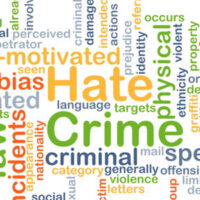Hate Crimes in Florida

The Florida Attorney General’s report on hate crimes stated that there were 168 reported hate crimes in 2018. Of those, 43.5 percent were race-related hate crimes. With the increase in awareness of Hate-Crimes and the expansion of Hate-Crime interpretation within the criminal justice system, this number may rise.
What Defines a Hate Crime
A hate crime is any crime against person or property that was motivated by a prejudice towards someone on the basis of their:
- Race or ethnicity,
- Ancestry;
- National origin;
- Gender or gender identity;
- Sexual orientation;
- Religion;
- Physical or mental disability;
- Advanced age of over 65 years; or
- Homeless status.
In order for a crime to be considered a hate crime, there must be substantial evidence that the motivation for committing the crime was based on the victim’s protected characteristic, such as their race or religion. For example, if a defendant punched an African American in a bar fight, it would only be classified as a hate crime if the defendant used racial language or there was other evidence to support his racist attack. If that evidence does not exist, the crime would not be considered a hate crime.
Reclassification of Hate Crimes
According to Florida Statute 775.085, the penalty for a felony or misdemeanor is to be reclassified if the commission of such felony or misdemeanor was deemed a hate crime. The reclassification escalates the crime to one degree higher than it would have been otherwise. For instance, if a person commits a felony of the third degree, such as aggravated assault, and there is evidence to prove it was motivated by a prejudice, then the charge is reclassified to a felony of the second degree due to its hate crime status.
Common Hate Crimes
Virtually any crime can be escalated to a hate crime. The most common are violent crimes, however, as well as vandalism/destruction of property. Examples of crimes that could potentially be reclassified as a hate crime when motivated by an attack on a protected characteristic include the following:
- Forcible rape or other sexual offenses;
- Murder and manslaughter;
- Robbery;
- Aggravated or simple assault;
- Burglary or breaking and entering;
- Larceny or theft;
- Motor vehicle theft;
- Kidnapping or abduction;
- Arson;
- Bribery;
- Weapons Violations;
- Vandalism;
- Trespassing;
- Extortion;
- Intimidation; and
- More.
Contact A Port St. Lucie Criminal Defense Attorney to Learn More
Being accused of a hate crime in Florida means you will face more serious criminal charges and could face extended jail time or be required to pay additional fines. It is important if you have been charged with prejudice when committing any criminal act against an individual or their property that you seek out skilled legal counsel. The Port St. Lucie criminal attorneys at Baginski Brandt & Brandt have experience handling hate crime charges in Florida. Contact our Port St. Lucie offices 772-466-0707 to schedule a free consultation today.
Resources:
myfloridalegal.com/webfiles.nsf/WF/TDGT-BKCR2R/$file/2018+Florida+Hate+Crimes+Report.pdf
sun-sentinel.com/news/politics/fl-ne-florida-white-nationalism-20190809-ab2aktyvtfe4bahwnmp766j7g4-story.html


